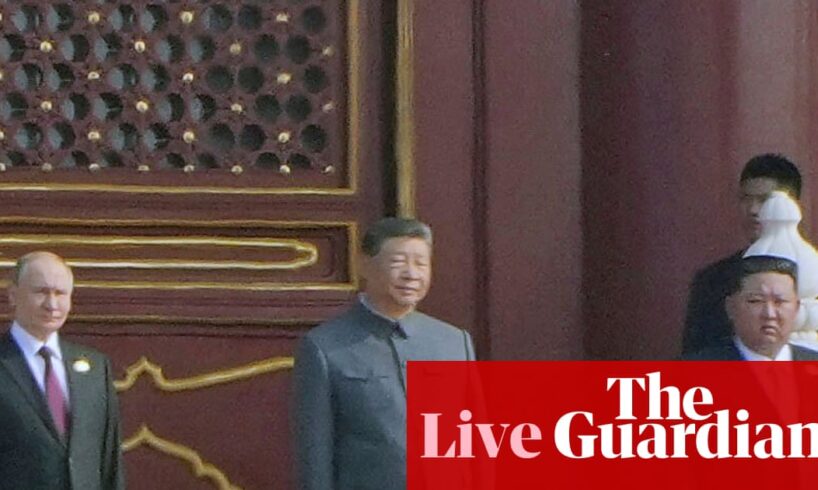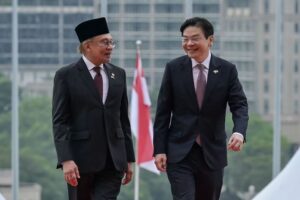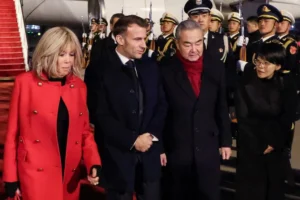
Xi, Kim, Putin appear together
The leaders of China, Russia and North Korea have been photographed walking to the parade together. It is a striking image, that has been beamed onto large screens in Beijing.
Xi Jinping (C) walks alongside Russia’s president Vladimir Putin (centre L) and North Korea’s leader Kim Jong -un (centre R) Photograph: Pedro Pardo/AFP/Getty ImagesShare
Key events
Show key events only
Please turn on JavaScript to use this feature
Read more about the significant meeting of Xi, Putin and Kim here:
Share
As the parade takes place, with Vladimir Putin in attendance, it is worth noting that all of Ukraine is under air raid alerts following Ukrainian air force warnings of Russian missile and drone attacks, military data shows.
Share
Updated at 04.06 CEST
Xi has returned to his seat overlooking the parade.
He is now peering up at the sky, where military aerial formations are flying.
Helicopters from the Chinese People’s Liberation Army air force fly in formation during a military parade marking the 80th anniversary of victory over Japan and the end of World War II, in Tiananmen Square on September 3, 2025, in Beijing, China. Photograph: Fred Lee/Getty ImagesShare
Updated at 03.52 CEST
Blake Sharp-Wiggins
Some images as the parade gets underway
The parade marks 80th anniversary of the end of the Sino-Japanese War in Beijing Photograph: Andrés Martínez Casares/EPAXi Jinping at the military parade Photograph: Lintao Zhang/Getty ImagesAttendees hold flags Photograph: Andrés Martínez Casares/EPAShareRebecca Ratcliffe
As the parade continues, a look at one of the notable guests in attendance.
Myanmar’s junta chief Min Aung Hlaing, who rarely travels abroad, is also in Beijing.
For Min Aung Hlaing, Beijing is a rare and crucial ally, and his visit to China – months ahead of controversial promised elections – is an important diplomatic opportunity.
Min Aung Hlaing has become increasingly isolated abroad since he seized power in a coup in 2021 – a disastrous move that provoked a defiant armed opposition movement and spiralling conflict.
Many Western countries downgraded relations and imposed sanctions in response to the coup, and the UN has repeatedly warned of possible war crimes and crimes against humanity by the military.
Steps taken by western countries have had little impact on the military’s actions. Instead China retains far greater influence over what happens next.
China sells weapons to and is an ally of the military, though their relationship is complicated. Beijing was displeased by the coup in 2021, fearing the military’s seizure of power would create instability, and threaten China’s economic investments and its strategic interests.
Min Aung Hlaing, acting president of Myanmar, in China this week. Photograph: Xinhua/Shutterstock
Over the years, it grew increasingly frustrated at Min Aung Hlaing’s inability to control the country and impose order. It has been especially concerned by the explosion in organised crime in Myanmar, with which it shares a border – especially the proliferation of “scam compounds” that have trafficked large numbers of Chinese nationals, and targeted the Chinese public with online scams.
Frustration prompted Beijing to give its tacit support to a 2023 offensive in northern Shan State by a coalition of ethnic armed groups that opposed the junta. However, when the success of this offensive looked like it might create a domino effect, and ultimately threaten the military’s grasp on power, China stepped up its support for the junta. It apparently feared the collapse of Min Aung Hlaing’s regime could ultimately be even worse for China’s interests.
China has since increased its diplomatic engagements with the junta, and has backed the junta’s plans to hold elections, due to be held in phases, starting 28 December. Many western governments will perceive the vote as a sham, but Min Aung Hlaing will hope the vote will lead to a reopening or normalisation of diplomatic relations with some regional countries. India, as well as China, have signalled support for the vote.
Share
What is at stake for Kim Jong-un?
Justin McCurry
Kim Jong-un has not left North Korea for two years, while it has been six years since he last visited China. The North Korean leader does not seem to share his father Kim Jong-il’s fear of flying – he flew to Singapore to meet Donald Trump in 2018 – but he could hardly be described as an enthusiastic traveller. So why has he decided to go to Beijing – again in a heavily armoured train – to attend Wednesday’s military parade?
Having once been isolated as part of George W Bush’s “axis of evil”, North Korea has exploited changes in the global geopolitical landscape to come out of the cold, triggering concern in South Korea and Japan. Now it is one third of what western analysts are calling an “axis of upheaval” along with China, Russia and Iran.
North Korean leader Kim Jong-un (C) as he departs from Pyongyang by special train to visit China. Photograph: KCNA via KNS/AFP/Getty Images
While the Trump administration invites a backlash through punitive trade measures imposed on traditional allies, Kim has improved his regime’s ties with Xi Jinping and Vladimir Putin. Reports that Kim and Putin will sit either side of Xi at Wednesday’s military parade to commemorate 80 years since Japan’s defeat in the second world war will be irrefutable evidence of a trilateral relationship designed to issue a direct challenge to what they see as western hegemony.
Kim’s friendship with Putin, whom he met in Russia in 2023 and again in Pyongyang last year, has proved useful for both leaders. Kim has sent thousands of his troops to fight alongside Russian forces against Ukraine – a show of support that has reportedly given him access to Russian expertise in developing weapons of mass destruction.
Kim’s relationship with Xi is more complicated. The Chinese leader has appeared more reluctant to antagonise the US through moving dramatically closer to Pyongyang, but China is still the North’s biggest aid donor – a role Kim is keen to build on for the sake of his country’s perennially struggling economy.
Kim is also wary of the recent thaw in ties between China and South Korea, prompting some analysts to speculate that his presence at the parade is a pre-emptive move to frustrate any potential meeting of minds between Xi and the South’s new president, Lee Jae-myung.
While Russia continues to attract international condemnation over its invasion of Ukraine, an unambiguous show of Chinese support for North Korea would represent a diplomatic coup for Kim – and make his long train journey to and from Beijing worth the effort.
A successful trip to the Chinese capital could result in a reciprocal visit by Xi to Pyongyang in October for the anniversary of the founding of North Korea’s ruling Workers’ party, according to Lim Eul-chul, a professor at the Institute for Far Eastern Studies Kyungnam University in South Korea. “If Kim succeeds in securing Xi’s visit, it would raise the regime’s status to its highest level,” Lim said.
Share
Updated at 03.42 CEST
Trump sends ‘warmest regards’ to Xi, Putin and Kim ‘as you conspire against’ the US
US president Donald Trump is clearly aware that the parade is taking place. He has posted to Truth Social about it:
“The big question to be answered is whether or not President Xi of China will mention the massive amount of support and “blood” that The United States of America gave to China in order to help it to secure its FREEDOM from a very unfriendly foreign invader. Many Americans died in China’s quest for Victory and Glory. I hope that they are rightfully Honored and Remembered for their Bravery and Sacrifice! May President Xi and the wonderful people of China have a great and lasting day of celebration. Please give my warmest regards to Vladimir Putin, and Kim Jong Un, as you conspire against The United States of America. PRESIDENT DONALD J. TRUMP”
Share
Marching has begun by the People’s Liberation Army (PLA).
Xi is riding in an open-topped car, surveying the troops.
China’s President Xi Jinping inspects the troops. Photograph: Pedro Pardo/AFP/Getty ImagesShare
Updated at 03.26 CEST
Snap analysis on the Xi, Putin, Kim photo
Justin McCurry
It is an image that, had it been published just a few years ago, would have been dismissed as a piece of mischievous photo-shopping: the leaders of Russia and China, accompanied by the head of a pariah regime whose mission to arm his country with nuclear weapons had been opposed in the United Nations by his two companions.
But dramatic shifts in the geopolitical landscape – Russia’s invasion of Ukraine and, crucially, the re-election of Donald Trump – have combined to bring Xi Jinping, Vladimir Putin and the North Korean leader Kim Jong-un together.
On Wednesday morning, the three men led a group of more than 20 world leaders as they strode towards a rostrum in Tiananmen Square in Beijing to watch a “victory day” parade in Beijing.
A TV screen shows Chinese leader Xi Jinping, Russian president Vladimir Putin and North Korea’s Kim Jong-un arriving for the military parade. Photograph: Florence Lo/Reuters
Xi Jinping, dressed in a grey Mao suit and flanked by Putin on his right and Kim on his left, is presiding over what could justifiably be described as proof that a second cold war has begun – led by a triumvirate of nuclear powers that have positioned themselves in diametric opposition to the US and its allies in the west.
The symbolism attached to the first-ever meeting between the three leaders threatened to overshadow the huge military parade snaking through the streets of the Chinese capital.
Just how the photo op will translate into action remains to be seen, but one world leader not on Wednesday’s guest list must surely be looking on with a mixture of curiosity and alarm.
Share
Updated at 03.39 CEST
Xi’s address continues:
History cautions us that humanity rises and falls together… Today humanity has to choose between peace and war.
He vows to speed up the building of a world class military, which is met with applause.
The Chinese nation is never intimidated by any bullies.
The speech has concluded, we will continue to keep you up to date.
Share
Xi’s speech begins
Xi Jinping is welcoming guests to the parade and delivering a speech.
He welcomes guests from around the world and says the parade is an occasion to remember history and “cherish peace” – paying tribute to veterans and soldiers.
Xi goes on to talk about China’s achievements in the second world war.
A display shows China’s President Xi Jinping delivering a speech in Tiananmen Square during a military parade on Wednesday marking the 80th anniversary of victory over Japan. Photograph: Lintao Zhang/Getty ImagesShare
Updated at 03.46 CEST





